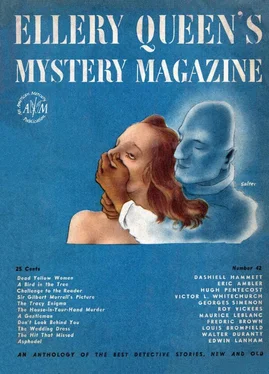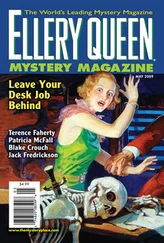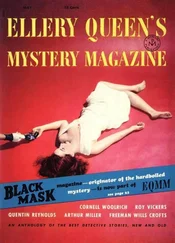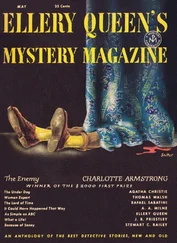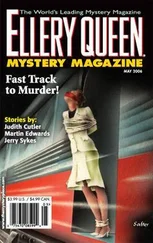Эрик Эмблер - Ellery Queen’s Mystery Magazine. Vol. 9, No. 42, May 1947
Здесь есть возможность читать онлайн «Эрик Эмблер - Ellery Queen’s Mystery Magazine. Vol. 9, No. 42, May 1947» весь текст электронной книги совершенно бесплатно (целиком полную версию без сокращений). В некоторых случаях можно слушать аудио, скачать через торрент в формате fb2 и присутствует краткое содержание. Город: New York, Год выпуска: 1947, Издательство: The American Mercury, Жанр: Классический детектив, Детектив, на английском языке. Описание произведения, (предисловие) а так же отзывы посетителей доступны на портале библиотеки ЛибКат.
- Название:Ellery Queen’s Mystery Magazine. Vol. 9, No. 42, May 1947
- Автор:
- Издательство:The American Mercury
- Жанр:
- Год:1947
- Город:New York
- ISBN:нет данных
- Рейтинг книги:3 / 5. Голосов: 1
-
Избранное:Добавить в избранное
- Отзывы:
-
Ваша оценка:
- 60
- 1
- 2
- 3
- 4
- 5
Ellery Queen’s Mystery Magazine. Vol. 9, No. 42, May 1947: краткое содержание, описание и аннотация
Предлагаем к чтению аннотацию, описание, краткое содержание или предисловие (зависит от того, что написал сам автор книги «Ellery Queen’s Mystery Magazine. Vol. 9, No. 42, May 1947»). Если вы не нашли необходимую информацию о книге — напишите в комментариях, мы постараемся отыскать её.
Ellery Queen’s Mystery Magazine. Vol. 9, No. 42, May 1947 — читать онлайн бесплатно полную книгу (весь текст) целиком
Ниже представлен текст книги, разбитый по страницам. Система сохранения места последней прочитанной страницы, позволяет с удобством читать онлайн бесплатно книгу «Ellery Queen’s Mystery Magazine. Vol. 9, No. 42, May 1947», без необходимости каждый раз заново искать на чём Вы остановились. Поставьте закладку, и сможете в любой момент перейти на страницу, на которой закончили чтение.
Интервал:
Закладка:
“Now look here, Rason, if you talk to the Press with a tale of a man frightened of cows, there’ll be trouble good and hot, and all of it for you.”
“I was thinking of the mental hospitals—”
“So was I — only I don’t mean what you mean. It’s facts we want, Rason. And if you’re lucky enough to find any, then we’ll fix ’em up with a theory.”
Lucky enough! Rason’s past successes in linking apparently unconnected events, in perceiving method in that which seemed blind chance, had never earned him a pat on the back for anything but his “luck.” Even when he found Harold Ledlaw, Karslake ungenerously asserted that success was thrown into his lap solely because he chanced to go to a particular picture theatre on a particular night with his sister-in-law.
He had invited his niece, whom he regarded, since his brother’s death, as an honorary daughter; but her mother had come instead.
They had arrived too early and were afflicted with a “short,” advertising a breakfast food, in which a spirit voice whispered to a young wife that her husband could not do a hard day’s work on just tea or coffee. What, therefore, should she put in his cup, held in a slender bejeweled hand? Trick photography then showed a huge cow galloping into the picture and leaping into the breakfast cup.
“Sorry, Meg,” said Rason. “I’ve got to go.”
“Why, George, what is it?”
“That damned cow!” chuckled Rason, and left her.
That was not luck, in Karslake’s sense. The whole of Scotland Yard might have seen that film without learning anything from its apparent irrelevance. But it was lucky that Ledlaw happened to be at Whiddon Cottage when Rason took Karslake there — though they would have caught him just the same if he had been elsewhere.
The day after his visit to Whiddon, Ledlaw had met his daughter. They had met as strangers and had approved of each other. When a month had gone by and the chances of his escape now seemed overwhelming, Mrs. Ledlaw consented to another meeting.
After the failure of the second Press campaign, Ledlaw was convinced that the trail was utterly lost, and Mrs. Ledlaw concurred. He reasoned that, if the police ever succeeded in finding the cottage, they would inevitably reach him through Mrs. Ledlaw. Therefore he risked nothing by taking his daughter home — which he did one evening in June. The efficient domesticity he witnessed awakened dormant longings.
“I have been thinking, Ruth,” he said at the end of June, “that if anything were to happen — not that we need fear it now — but if it were to happen, you would be in a dangerous position for having shielded me. You would certainly go to prison. But if we were married, you could successfully plead that you acted under my domination — absurd, my dear, though it may sound.”
On the understanding that it was to be a marriage of companionship only and on the further understanding that he would take steps to pursue his profession of engineering, Mrs. Ledlaw re-married him on July 11th.
By this time he had long lost all sense of peril. Indeed his crime, when he thought of it, seemed no more than a bad dream, of which the details were already blurred.
In August there was a strike at the engineering works, leaving nothing for the supervising engineer to do. So Ledlaw was pottering in the garden when the car containing the detectives arrived towards the end of the morning. Mrs. Ledlaw, hearing the car, came out of the cottage.
Rason, carrying a largish bag, was in nominal charge. As they got out of the car, Karslake muttered: “It’s not the place. It’s not a bit like it, except for the cottage itself. It’s no different from sixty others.”
“Mr. Ledlaw?” asked Rason, having learned the name at the local police station. “We are from Scotland Yard. I believe you knew Albert Henshawk?”
“The fellow who was murdered? We wondered.” He turned to his wife. “This is Mrs. Ledlaw. We knew an Albert Henshawk slightly some twenty years ago. But we lost touch. Anyhow, what did you want to ask us about him?”
“I want to know when you last saw Albert Henshawk, Mr. Ledlaw.”
“But you aren’t connecting my husband with the murder?” boomed Mrs. Ledlaw, “because we live in a seventeenth century cottage. The local sergeant told me he had reported this cottage at the time, and it was inspected by a Scotland Yard man.”
“It isn’t very like the one in the picture, you know,” said Ledlaw tolerantly. “True, there are somewhat similar oaks. But there—” he waved his hand at the half-mile of hillside sloping down to the Thames.
Karslake maintained a glum silence, wondering how they would explain Rason’s ineptitude. Rason opened his bag, took out the original model of the cottage, and laid it on the ground.
“I admit it’s not a bit like it,” he said.
Ledlaw smiled, while Karslake looked glummer than ever. Rason continued:
“But that is because — that darned cow spoils the whole thing , Mr. Ledlaw.”
Ledlaw’s face was expressionless.
“I can’t follow that,” said Mrs. Ledlaw.
“Funny thing, Mrs. Ledlaw. I went to the pictures last night. Saw a film where a whopping big cow appears to jump into a tea cup. Clever bit of photography — messing about with perspective. Made me think of this cow. So I thought — well, look here!”
The last was addressed mainly to Karslake. As Rason spoke, he plucked the figure of the cow from the model.
“Good Lord!” muttered Karslake, gaping from the model to the landscape and back again at the model.
With the removal of the cow, the meadow had vanished! It became, in fact, a half-mile of sloping hillside, while the “brook” was instantly recognizable as the Thames, half a mile away in the valley below.
“No deception in this trick, ladies and gentlemen!” chirped Rason, and fitted the peg back into its socket — thus restoring the meadow, with a brook from which a cow was drinking.
“It’s messing about with perspective. Got the idea from that cow jumping into the tea cup.” he told them all over again. “That’s what you meant when you told Henshawk the damned cow spoiled the whole thing, wasn’t it, Mr. Ledlaw! I suppose you can account for your movements on the evening of February 16th?”
“I can, if he can’t,” said Mrs. Ledlaw. “He was here. I remember the date, because he was asking me to marry him.”
“Last February, madam!” cut in Karslake. “We are informed that you have a grown-up daughter. And that she’s known as ‘Miss Ledlaw’.”
“Yes, but it’s all quite simple, really,” said Mrs. Ledlaw. “You see, we were divorced some years ago. And then we thought better of it — you look as if you didn’t believe me.”
“It’s of no great importance at the moment, Mrs. Ledlaw—”
“It is of great importance to me,” retorted Mrs. Ledlaw. “I insist on your inspecting my marriage certificate. I will not keep you more than a couple of minutes.”
When she had gone, Karslake spoke to Ledlaw.
“If you deny that you saw Henshawk that day, Mr. Ledlaw, are you willing to come back with us to London and let us see if Henshawk’s secretary and the porter recognize you?”
“Certainly not. You’ve no case against me. You can darned well bring them down here, if you’re so keen to waste your time.”
Mrs. Ledlaw was coming from the house carrying his dispatch case, which had become hers.
With horror he suddenly remembered.
“The certificate is not in there, dear. I took it out last week. Don’t you remember, Ruth?”
“Oh, of course! How stupid of me!”
But there had been altogether too much anxiety in Ledlaw’s voice. Karslake strode forward.
Читать дальшеИнтервал:
Закладка:
Похожие книги на «Ellery Queen’s Mystery Magazine. Vol. 9, No. 42, May 1947»
Представляем Вашему вниманию похожие книги на «Ellery Queen’s Mystery Magazine. Vol. 9, No. 42, May 1947» списком для выбора. Мы отобрали схожую по названию и смыслу литературу в надежде предоставить читателям больше вариантов отыскать новые, интересные, ещё непрочитанные произведения.
Обсуждение, отзывы о книге «Ellery Queen’s Mystery Magazine. Vol. 9, No. 42, May 1947» и просто собственные мнения читателей. Оставьте ваши комментарии, напишите, что Вы думаете о произведении, его смысле или главных героях. Укажите что конкретно понравилось, а что нет, и почему Вы так считаете.
